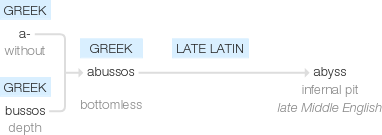Abyss
late Middle English (in the sense ‘infernal pit’): via late Latin from Greek abussos ‘bottomless’, from a- ‘without’ + bussos ‘depth’.
wiktionary
From Middle English abissus, from Late Latin abyssus(“a bottomless gulf”), from Ancient Greek ἄβυσσος(ábussos, “bottomless”), from ἀ-(a-, “not”) + βυσσός(bussós, “deep place”), [1] [2] from βυθός(buthós, “deep place”). [3]
etymonline
abyss (n.)
late 14c. in Latin form abyssus, "depths of the earth or sea; primordial chaos;" early 14c. as abime "depths of the earth or sea; bottomless pit, Hell" (from Old French; see abysm). Both are from Late Latin abyssus "bottomless pit," from Greek abyssos (limne) "bottomless (pool)," from abyssos "bottomless, unfathomed," hence, generally, "enormous, unfathomable," also as a noun, he abyssos "the great depth, the underworld, the bottomless pit." This is a compound of a- "without" (see a- (3)) + byssos "bottom," a word of uncertain origin possibly related to bathos "depth" [Liddell & Scott]. Watkins suggests a connection with the root of bottom (n.); Beekes suggests it is pre-Greek.
The current form in English is a 16c. partial re-Latinization. Greek abyssos was used in Septuagint to translate Hebrew tehom "original chaos" and was used in the New Testament for "Hell." OED notes, "the word has had five variants, abime, abysm, abysmus, abyssus, abyss; of which abyss remains as the ordinary form, and abysm as archaic or poetic." In reference to a seemingly bottomless gulf from 1630s.
